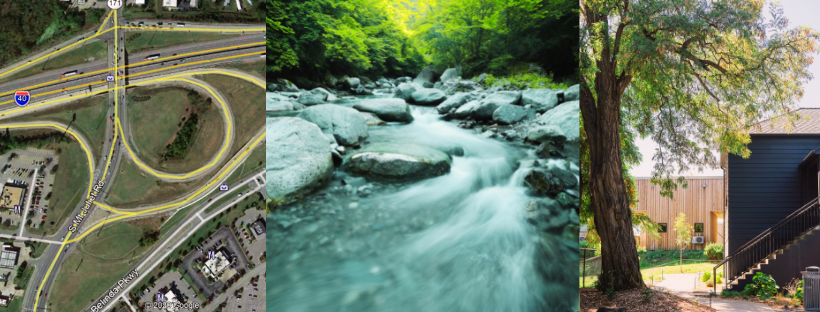|
Green Interchange’s mission is to plant trees and establish and sustain natural systems for healthier communities, economies, and quality of life. This expanded new mission statement more accurately reflects all the important work we have done and will be doing into the future. Like a tree, our mission is growing. When we launched Green Interchange in 2020, our focus was on planting trees in highway interchanges, and our primary goals were offsetting carbon dioxide (CO2) emissions and beautifying the state. These are still important goals, and our original impact statement explains how we continue to make a difference in this area. At the same time, we recognize the benefits of planting trees go far beyond CO2 reduction and beautification. Additional benefits include moderating temperatures, filtering stormwater, reducing flooding, saving taxpayer dollars, providing health benefits for people, and much more. Trees offer all these amazing benefits, yet there are other natural solutions that can help. Natural grasses, flowers, and other natural systems can offer many of the same benefits for interchanges, especially in areas where planting trees is not possible or ideal. Our new mission reflects all the benefits that come from planting trees and implementing other natural solutions along interstates as well as roadways, waterways and other ways. In 2021, we began planting trees along waterways (learn more here), and this became an important new focus, because the land along waterways is an important transition zone. Stream sides are the “interchange” between land and water and thus a critical area of importance. “These buffers can help stabilize eroding stream banks, filter out sediments and chemicals before they reach the waterway, help recharge groundwater, preserve or improve wildlife and aquatic habitat, and add scenic and economic value to the land,” says the Tennessee Department of Agriculture. For every dollar we spend restoring a stream bank, the community gains a dollar and a half in benefits including cleaner drinking water, reduced flooding, more wildlife and increased recreational opportunities. Waterways and highways are two important areas in which we operate, and Green Interchange is now working in other places, or “other ways”, as well. In 2021 we launched our Plant a Tree for Tennessee program, helping volunteers plant 7,500 trees in their yards and in the community. We also began work with school arboretums, helping Algood Middle School as they work to expand their arboretum and work toward Level II Arboretum accreditation. We will continue to offer opportunities to plant more trees and other natural systems in “Highways, Waterways, and Other Ways” including both public and private spaces. As we examined our expanded mission statement, we asked our Board of Directors, “Does our name, Green Interchange, still describe our work?” The answer was a resounding “YES”. The word interchange has several definitions including “exchange” which Merriam Webster says is, “the act or process of substituting one thing for another.” We know that planting trees and other natural systems is an important “exchange” with tremendous benefits, especially when we work in areas where these natural systems are damaged or destroyed. You can help us advance our mission and make a difference in Tennessee. We are always looking for volunteers and your tax-deductible donations help! A contribution of just $6 helps us plant one tree, and donating $6 monthly will help cover your carbon emissions from car travel!
Comments are closed.
|
Categories
All
Archives
April 2024
|


 RSS Feed
RSS Feed
